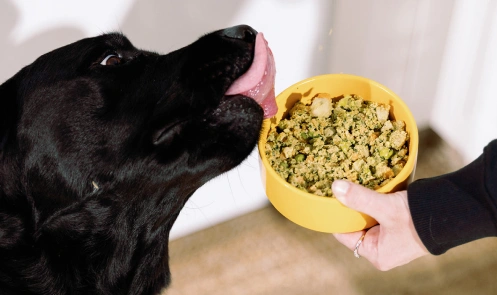Causes of Vomiting in Dogs
When Your Dog is Vomiting White Foam
Dog Vomit Color Guide
How to Treat Vomiting in Dogs
Vomiting in Puppies
When is Dog Vomiting an Emergency?
There are a million (or so) reasons your dog might throw up, and the vast majority aren’t any serious cause for concern.
According to board-certified veterinary nutritionists, dogs tend to bounce back from vomiting more quickly than humans.
Still, any vet will tell you that dog vomit can be a symptom of issues ranging from the mild to the severe. Especially if you’re not already familiar with the ins and outs of your dog’s microbiome. But first, a key distinction:
Dog Vomiting vs. Regurgitation
Though the terms are often used interchangeably, dog regurgitation and dog vomiting have very different definitions, and often very different causes.
Vomiting In Dogs…****
typically involves active abdominal contractions. You might hear your dog make a retching noise, see his abs working, or notice that he’s hunched over, drooling or licking his lips. It typically comes up with yellow bile.
Regurgitation In Dogs…
starts in the esophagus or pharynx, usually without any warning — and without abdominal contractions. The regurgitated material may be coated with saliva and mucus, and typically appears completely undigested.
What Causes Vomiting In Dogs?
If your dog is in fact vomiting (and not just regurgitating), you’ll want to work with your vet to find out the cause as quickly as possible. We break it down into three categories for the likely candidates:
Diet-Related Causes
Environmental Causes
Health-Related Causes
Diet-Related Causes of Vomiting in Dogs
Gastroenteritis**
**
Gastroenteritis in dogs is one of the most common causes of vomiting. It’s a common inflammation of the stomach and intestines due to a sudden change in diet or ingestion of a foreign object.
What to Do: Gastroenteritis in dogs usually resolves itself without any treatment, but fasting may be helpful. Make slow, attainable adjustments to their diet rather than big leaps.
Dog Food Allergies**
**
Food allergies tend to show up in the form of skin or gastrointestinal problems, though they’re far less common in dogs as they are people.
What to Do: Determining which food or foods are causing the reaction in your dog can be tricky, and usually requires a food trial. Read more about how to conduct one right here.
Dog Food Intolerance**
**
No one quite knows the reasoning behind food intolerances in dogs, but it may be due to sensitivity to specific nutrients or compounds in foods.
What to Do: Either way, detecting a food intolerance requires a bit of trial and error. Once you’ve identified the culprit, start eliminating it gradually from your dog’s diet.
Bilious Vomiting Syndrome (BVS)****
Bilious Vomiting Syndrome is a sensitivity to the bile present in the dog’s own stomach, resulting in green-and-yellow intermittent vomiting.
What to Do: Feeding your dog more frequently, especially late at night, can help manage the symptoms.
Pancreatitis**
**
Pancreatitis in dogs is characterized by inflammation in the pancreas, presenting in acute or chronic episodes that can include throwing up.
What to Do: If your dog is vomiting repeatedly, hunching or running a fever, your vet can run a blood test to test for pancreatitis. In dogs, both acute and chronic pancreatitis may solve themselves after you wean them back onto their normal — or if necessary — low-fat diet.
(P.S. Some foods people eat regularly are toxic to and can cause vomiting in dogs, as well as some of the above conditions. Find a brief list of the most common ones here.)
Environmental Causes of Vomiting in Dogs
Foreign Object Ingestion
Many dogs don’t discriminate. Toys, rocks, underwear— you name it, and dogs will swallow it. These things can get stuck in the outflow of the stomach or in the intestine, which causes a backup—and vomiting follows.
Vomit-Inducing Parasites**
**
While the word “parasite” usually makes us think of worms, there are many vomit-inducing parasites completely invisible to the human eye.
What to Do: Be preventative. The best course of action is always routine deworming and fecal examinations.
Toxins**
**
Chemicals, cleaners, fertilizers, antifreeze, topical flea and tick medications and even certain plants consist of serious toxic materials that can pose serious danger for your dog and cause vomiting.
What to Do: If your dog has had exposure to any of these directly before vomiting, call your vet or contact ASPCA poison control for more information.
Medicines or Supplements**
**
Watch out for:
- Flea and tick preventatives
- Non-steroidal anti-inflammatory drugs
- Cyclosporine
What to Do: Your dog’s condition should improve shortly after vomiting their medication. If not, call your vet or local pet emergency facility.
Infections
Fungal infections that affect the gastrointestinal tract and cause vomiting are rare in dogs, but do still occur.
What to Do: Your dog’s condition should improve shortly after vomiting their medication. If not, call your vet or local pet emergency facility.
Health-Related Causes of Dog Vomiting
Gastric dilatation or gastric dilatation-volvulus (GDV)****
Gastric dilatation (in dogs) is a fast-progressing and potentially life-threatening condition. It’s an issue usually in large breed, deep-chested dogs, and the exact cause is unknown.
What to do: If your dog is dry-heaving, seems extremely uncomfortable and fits the big dog profile, call the vet ASAP.
Hemorrhagic gastroenteritis (HGE)****
Strangely enough, most cases of HGE occur suddenly in otherwise healthy dogs; it’s more common in smaller breeds.
What to do: Fortunately, the condition seems to resolve itself over the course of a few days with proper supportive care. Dogs can become dehydrated rapidly, so contact your vet.
Inflammatory bowel disease (IBD)****
IBD usually happens when abnormal amounts of immune cells mount in the dog’s intestines and/or stomach.
What to do: Medication, diet changes or B12 supplementation may be necessary. Speak with your vet about the options for your dog.
Cancer**
**
Sadly, cancer can cause just about any symptom in dogs. And dogs with cancer may experience vomiting related to tumors or related complications.
What to do: Develop a care plan with your vet if you haven’t already. Many counseling services, like CancerCare can help you find free resources and financial assistance along the way for your dog.
Kidney Disease**
**
Chronic kidney disease in dogs generally shows itself with excessive drinking, urination and at times increased vomiting.
What to do: Again, develop a care plan for your dog with your vet if you haven’t already.
Liver and/or Gallbladder Disease**
**
Infections and inflammation in the liver and gallbladder are commonly known to cause vomiting
What to do: Your dog may need further supplementation, diet alterations or more serious examination. Speak with your vet before you do anything.
Dog Diabetes**
**
As in humans, diabetes in dogs directly correlates to metabolism. Diabetic dogs often vomit, drink and urinate more often than usual before they’re diagnosed.
What to do: Talk to your vet about diet adjustments, insulin injections and management plans to help them avoid further vomiting episodes.
Infections in Dogs**
**
Infections of the stomach and intestines are certainly possible in dogs, but they’re not as often a cause of chronic vomiting.
What to do: Typically, dogs will clear harmful bacteria or require acute treatment for infections like salmonella.
Adrenal dysfunction**
**
If your dog is chronically producing too few hormones (Addison’s disease) or too many (Cushing’s disease), either condition can cause vomiting.
What to do: Addison’s and Cushing’s diseases require persistent management and a long-term care plan developed between you and your vet.
When Your Dog Is Vomiting White Foam**
**
One of the most common causes for concern — especially for new dog owners — is white foam. Dogs can vomit white foam for any number of reasons, including everything from a touch of indigestion all the way up to rabies. The most common causes for your dog vomiting white foam are:
- Acid reflux
- Common indigestion
- Kennel cough
None of which are particularly dangerous, especially when treated swiftly. That said, white foam could also be an indicator for pancreatitis, bloat, kidney problems or ingestion of an inedible object. All of which are cause for more serious concern.
If the white foam expulsion appears to be more than an isolated incident, get in touch with your vet ASAP.
Dog Vomit Color Guide
Yellow dog vomit, red dog vomit, green dog vomit. What’s it matter if it’s all… dog vomit? Unseemly as they all may seem, the color is often the fastest way of narrowing down the cause of your dog’s vomit. But before you go searching for a color wheel and a magnifying glass, feel free to refer to our handy chart and some common sense:
Yellow Dog Vomit
Most Common Cause: Excess bile or related diseases
Your Next Move: Talk to your vet if issue is persistent. Most dogs have some bile in their vomit no matter what the cause.
Black Dog Vomit
Most Common Cause: Dirt, soil or ulcerous material
Your Next Move: Seek immediate attention if the vomit is dark and tarry with a magenta tinge. Try to determine what they may have eaten otherwise.
White Dog Vomit
Most Common Cause: Saliva, bloat or regurgitation
Your Next Move: Wait to see how they recover and talk to your vet if the situation worsens.
Red Dog Vomit
Most Common Cause: Digested blood
Your Next Move: Seek immediate attention.
Green Dog Vomit
Most Common Cause: Bile or plant material
Your Next Move: Wait to see how they recover and talk to your vet if the situation worsens.
Brown Dog Vomit
Most Common Cause: Intestinal blockage
Your Next Move: Talk to your vet if brown coloration is not easily explained.
How to Treat Vomiting In Dogs
Fasting**
**
Most people wonder — what should I feed my dog after they vomit? But the presence of food in an irritated stomach often causes more vomiting. That means you can try fasting your dog for 24 hours, while offering plenty of access to water.
Over-the-counter Remedies**
**
While certain antacids like famotidine (Pepcid) do not appear to be very effective in dogs, others like omeprazole (Prilosec) and its prescription cousins may work.
Natural Remedies**
**
Ginger, too, has natural anti-nausea properties and may help to relieve vomiting in dogs in some cases; see dosing information here.
Probiotics**
**
Probiotics for dogs, aka “good bacteria,” may help some cases of vomiting, especially those related to infection or inflammation in the dog’s stomach and intestines.
Prescription Medications**
**
Maropitant (Cerenia) has more recently become a common anti-nausea medication for dogs — your vet may prescribe it to help relieve symptoms. Ondansetron and metoclopramide are some other names you might see when the topic comes up.
Adjusting Your Dog’s Diet
When treating vomiting in dogs, your vet may recommend a more digestible diet such as a fresh food meal plan made with lean meats like poultry and rice or potato. More digestible foods may help to prevent excess material from reaching the large intestine and stimulating the process all over again.
We’d be remiss if we didn’t mention that fresh dog food can also help a dog with a sensitive stomach. Check out success stories from happy Nom Nom pups like Jordy and Harold.
Vomiting in Puppies
Puppies, as you probably know, are particularly vomit-prone. Their knack for adventure can lead them to chewing, gnawing or even swallowing what seems like everything but food.
Puppies frequently develop gastroenteritis from ingesting plant material or off-limits human food. But as with adult dogs, isolated vomit isn’t much to worry about. Repeat or regular vomiting, however, is worth your attention. Certain infections like Parvovirus (or “Parvo” as the vets call it) can cause rapid dehydration and consistent vomiting, and occur more frequently in puppies than adult dogs.
When is a Dog Vomiting an Emergency**?**
Fortunately, like we mentioned waaaay back at the beginning of this guide, most causes of dog vomiting aren’t emergencies. Here’s a handy explainer to help you decide when to see a vet, and when to simply let time heal.
Give it Time
- Dog vomits only once or a few times
- Dog acts normal after throwing up
- Dog vomiting caused by predictable source such as new medication
See the Vet
- Frequent vomiting lasting longer than 24 hours in duration
- Throwing up blood
- Dehydration
- Weakness or lethargy after vomiting
- History of toxin or foreign body ingestion
- Dog unable to produce vomit despite trying





